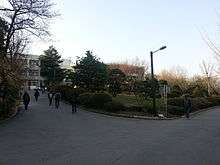Kyunggi High School
Kyunggi High School (Korean: 경기고등학교; Hanja: 京畿高等學校) is the oldest modern high school in Korea, located in Gangnam-gu, Seoul. The school is an all-boys school, and its counterpart is Kyunggi Girls' High School, also located in Gangnam-gu, Seoul.
| Kyunggi High School 경기고등학교 | |
|---|---|
 | |
| Location | |
643 Yeongdong-daero, Gangnam-gu | |
| Coordinates | 37°31′02″N 127°03′21″E |
| Information | |
| Type | Public, Secondary |
| Established | 1899 |
| Opened | 1900 |
| Principal | Park Gun-Ho (박건호) |
| Gender | Boys |
| Website | www |
| Korean name | |
| Hangul | |
| Hanja | |
| Revised Romanization | Gyeonggi Godeung Hakgyo |
| McCune–Reischauer | Kyŏnggi Kodŭng Hakkyo |
Kyunggi High School has educated many leaders of South Korean society. It is the "K" in the so-called "K-S mark," an informal reference to educational credentials said to ensure career success while the "S" being Seoul National University.[1][2] Before the abolition of high-school entrance exams in 1974, it was the highest-ranked school in the country.
Alumni associations for the school are widespread throughout Korea and abroad. Famous alumni include former ambassador Hong Seok-hyun and the former Hannara Party leader Lee Hoi-chang, as well as early Korean Communist Party leader Pak Hon-yong (class of 1919). Multiple Olympic medalist swimmer Park Tae-Hwan graduated in February 2008 (the Korean academic year starts in March and ends in February).
History
The school was established by edict of the Emperor Gojong on April 4, 1899, and opened its doors on November 10, 1900. The school's original name was Gwallib Middle School (관립중학교). Its establishment was part of a general program of educational modernization. This effort at modernization was swallowed up by the Japanese annexation in 1910, but the school itself survived. Originally chartered as a middle school, it became a high school in 1906, though it continued to offer middle-school classes until 1971.
In 2000, the South Korean government issued a commemorative 170-won stamp, marking the school's 100th anniversary.[3]
- 1906 Sep 1st, Renamed to National Hansung High School
- 1910 Nov 1st, Annexed Hansung Foreign Language School and renamed to Kyungsung High School.
- 1911 Apr 1st, Opened a one-year course for producing teachers.
- 1921 Apr 1st, Renamed to Kyung-sung First Middle School.
- 1938 Apr 1st, Renamed to National Kyunggi Middle School.
- 1938 Jun 4th, Set the school's flag
- 1945 Oct 1st, Hun-gu Lee (이헌구) was the 15th principal of the school and also was the first Korean principal since World War II.
- 1951 Aug 31st, Divided into two schools (Kyunggi Middle School and Kyunggi High School) according to the new law.
- 1954 Jun 25th, Set the school's new flag
- 1955 Aug 15th, Constructed a new building for Hwa-dong (화동) middle school.
- 1956 Jan 27th, Set the school's motto to liberal, culturally advanced, and peaceful people.
- 1971 Feb 28th, Kyunggi Middle School is closed.
- 1971 Nov 11th, Opened a hall of residence for freshman. Every freshman spends two weeks a year in this dormitory.
- 1974 Mar 1st, The government abolished the high-school entrance exams. This highest-ranked high school was populated by the students who live near the school.
- 1976 Feb 20th, Relocated to 74-4 Samsung-1-dong Kang-nam-gu, Seoul, Korea.
- 1981 Aug 3rd, Founded a juridical foundation named Hwa-Dong-Yuk-Young-Hoe. (화동육영회)
- 1983 Oct 3rd, Constructed a new building for the alumni association.
- 1990 Oct 3rd, Built a school motto stone.
- 1997 Dec 6th, Constructed a new building named Hwa-dong-kwan (화동관) for accommodating more students.
- 2010 Feb, Hosted 106th annual graduation commencement.
- 2010 Jul, Selected as a high school specialized on science.
- 2010 Summer, The former principal Jung-gon Lee (이정곤) resigned over power abuse scandals.
- 2011 Feb, Hosted 107th annual graduation commencement.
Notable alumni
- Choi Kyu-Ha: politician, 4th president of the Korea Republic
- Lee Soo-Young: businessman: former president of Korea Employers Association
- Chung Un-chan: economist and the former president of Seoul National University
- Kim Geun-tae: politician
- Kim Woo-Joong: founder and former chairman of Daewoo group
- Benjamin W. Lee: theoretical physicist
- Lee Hoi-Chang: politician and the former prime minister of South Korea
- Seung Hwan Oh: baseball, Olympic gold medalist
- Nam June Paik: inventor of video art, exhibited in museum of modern art, Whitney museum of American art, Guggenheim museum, Smithsonian museums, national gallery of art, Paris city museum of modern art, et al., and recipient of order of cultural merit (Korea), Picasso medal, Kyoto prize, golden lion (Venice), et al.
- Park Tae-Hwan: swimmer, the first-ever South Korean Olympic gold medalist in swimming
- Kuk Young: president of Daegu Gyeongbuk Institute of Science and Technology
- Oh Se-jung: politician and 27th president of Seoul National University
- Son Hak-gyu: politician and the former governor of Gyeonggi-do
- Hong Seok-Hyun: former South Korea's ambassador to the United States
- Bang Si-hyuk: songwriter and producer, founder and CEO of Big Hit Entertainment
- Park Jin-young: actor and member of boy band Got7 under JYP Entertainment
See also
- Education in South Korea
- List of Korea-related topics
External links
- Kyunggi Alumni Associations in America (in Korean)
- School website (in Korean)
- Kyunggi Washington Alumni Association (in Korean)
References
- Chang, Chan S. and Chang, Nahn J. (1994), The Korean Management System: Cultural, Political, Economic Foundations, Praeger, p. 64CS1 maint: multiple names: authors list (link)
- Lew, Seok-Choon (2013), The Korean Economic Developmental Path: Confucian Tradition, Affective Network, Palgrave Macmillan, p. 64